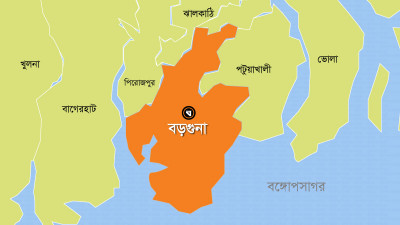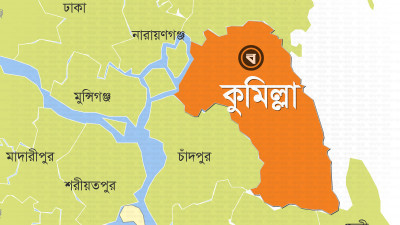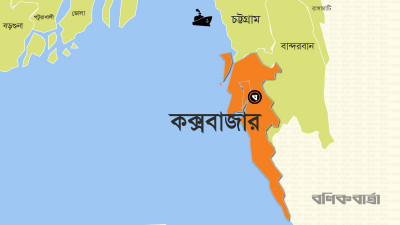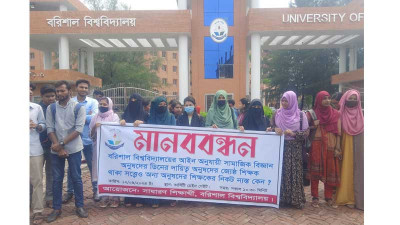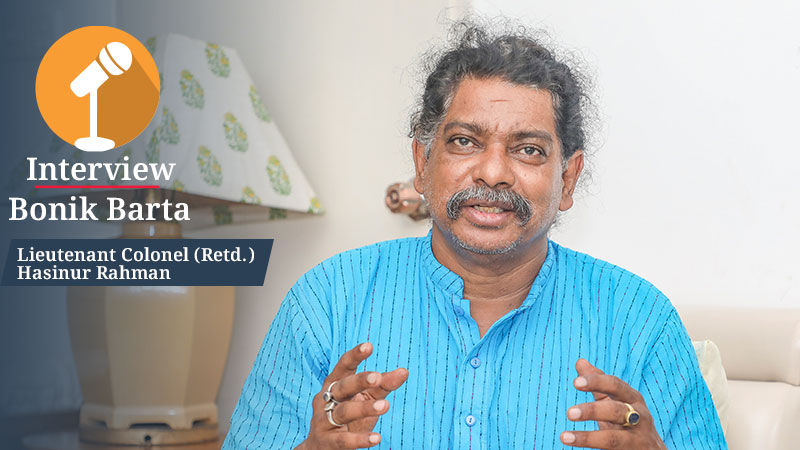 Photo: Bonik Barta
Photo: Bonik Barta Former army officer Lieutenant Colonel (Retd.) Hasinur
Rahman was detained twice in the notorious "Aynaghar" (room of
mirrors) facility: once in 2011 and again in 2018. He was also dismissed from
the army on charges of treason. He talked with Bonik Barta on his detention and
experience in Aynaghar. Interviewed by Anika Mahjabin.
Why were you taken to the Aynaghar?
I was targeted for writing on social media. I used to
speak out about the BDR issue. Sheikh Hasina herself was involved in the BDR
killings, and those around her are also responsible. After the BDR incident,
90-95 percent of the army personnel hated Sheikh Hasina's government. The
remaining 5 percent who supported her were the corrupt generals. During my time
with the RAB, I was asked to work with the intelligence agency of a neighboring
country, but I refused. In 2011, I was abducted for that while still on duty.
The first time, I was abducted under the pretext of
planning a coup, which was false. At that time, I was held for 43 days. Later,
as a punishment for sharing a negative post criticizing a former army chief, I
was arrested from Mirpur DOHS on October 8, 2018. On that day, when they came
to abduct me, I was armed. I managed to control them for a while, but
eventually, there was a scuffle. At that point, I threw the weapon I had
against the wall. Later, the police arrived and recovered the gun, and a
seizure list was prepared. The main evidence of my abduction is the seizure
list from Pallabi Police Station. Before this, on September 5, 2018, I had been
officially declared unwanted by the army.
On the first day after they picked me up in 2018, they
tortured me and almost made me unconscious. After the election that year, I
thought I would be released. But I saw no sign of leaving. I was released on
February 22, 2022.
After being released from the Aynaghar, 10 cases were
filed against me. At that time, police officers used to come and search every
day. As a result, I lived outside without using any phone for two years. Then,
those who were freed from the Aynaghar, rarely spoke. I was the only one
talking. Scientists Iqbal Chowdhury and Maruf Zaman were also victims of
disappearance.
When numerous cases were filed against me, I was forced
to tell the incident to the United Nations Human Rights Advisor Huma Khan, the
American Embassy, the European Union, etc. At that time, Sweden-based media
outlet Netra News published news about it. Then the question arises: Should
these people be brought to account?
Who controlled Aynaghar?
Major General (Retd.) Tarique Ahmed Siddique, who was
Sheikh Hasina's then-security advisor, made all the decisions about who to
arrest and who to abduct. Sheikh Hasina took care of the major issues, while
Tarique Siddique handled minor ones. Since I was in the army, the decision to
abduct me was made directly by Sheikh Hasina. Sheikh Hasina made the decisions
directly, and Tariq Ahmed Siddique implemented them. At the lower levels, the
DGFI and RAB decide whom to pick up and whom to target. These two agencies
monitored those who spoke out the most. Major General (Retd.) Ziaul Ahsan and
Tarique Ahmed Siddique coordinated these efforts. One former Additional
Director General (ADG) of the RAB also played a mastermind role in this.
The role of the National Telecommunications Monitoring
Center (NTMC) was crucial in this context. General Aziz acquired this system
around 2018 for control purposes, but it was put into use in 2020. This system
made it very easy to track who was where and monitor what people were saying.
The NTMC was under the DGFI, overseen by Major General (Retd.) Ziaul Ahsan.
The then-director of the Counter Terrorism and
Intelligence Bureau (CTIB) was also involved in my abduction. Several
individuals, including Major General (Retd.) Saiful Abedin was involved with
the DGFI in this matter.
How was the scenario inside Aynaghar.
At first, I didn't understand where I was. The guards
there would occasionally dismissively say, "You are in Aynaghar, do you
understand?" Later, I realized that it was a cell where no light comes in.
Aynaghar is a metaphorical name. It means you will be in a room where you can
only see yourself and not anyone else. It is a deceptive name. There is no fan
in Aynaghar. Instead, high-power bulbs are on 24 hours a day. You cannot
communicate with anyone in the adjacent rooms. Every room in the new building
has cameras.
Aynaghar had 27 special rooms. I saw seven or eight
red-colored phone numbers written there. No pens were provided, so the numbers
were written using blood drawn from cuts made on the fingers with teeth. Some
were written in fine script, others in thick. It's obvious just by looking. The
moment you enter the room, you feel a sense of fear.
The room was six by nine feet and was dark 24 hours a
day. Due to the sweltering heat there was excessive sweating from the body. It
was impossible to sleep at night. There was a bed in the cell, but due to
bedbugs, it was not possible to sleep on it. I had to sleep on the floor.
During the rainy season, the rooms were damp and musty. Poor-quality sheets
were used on the bed, and torn vests and old lungis previously used by others
were provided. A small towel was given for the bathroom, which had been used by
five or more people. No sandals were provided, so I had to walk barefoot. All
of these conditions worsened our situation.
In addition, almost everyone in the rooms would scream in
fear. The anxiety about how their family was doing and how their wife and
children were was overwhelming. I was also terrified on the first day. I heard
the screaming and wondered if they had brought my wife or daughter. They could
have done anything. There was no sense of ethics or morality with them. There
were times when someone would arrive in a room today when no one was there the
previous day. Perhaps the lights were on today. This would make me panic.
At night, they would bring someone in after torturing
them. You could hear the person screaming as they were brought to the room.
Next door was the interrogation cell, and I could hear the screams from there.
No one could sleep through that noise. To add to the intimidation, they would
walk around the veranda in the middle of the night and shout at us.
During the day, for bathing and other needs, I was taken
to the bathroom four times. I was blindfolded and handcuffed when being taken
from the cell to the bathroom. After returning from the bathroom, I was put
back in the cell, and the door was locked from the outside. There was an iron
gate in front of the cell and behind it, a wooden barrier with a small hole.
Through this hole, they observed what was happening in the cell.
Every Friday, a barber and a person to clean the room
would come. In the army, the person who cleans is called 'NC.' The people who
came here responded when I called them 'NC,' which made me realize they were
from the army. Every morning, someone would knock loudly on the door to call
us. There were instances where the person named would never return. As a
result, I was always in a state of fear, wondering if they were coming to take
me away for good or if, this time, they would kill me.
During your time in Aynaghar, what kind of physical
issues did you experience?
While I was there, I had a stroke once. At the time, they
said there was no problem and that it would get better on its own. No medical
treatment was provided. For the first few days, nothing was done, and later, I
was given blood pressure medication as per the usual routine. There were a lot
of mosquitoes there. My entire body was covered in mosquito bites, and even
after two years, the marks are still there. The condition was so wrong.
They gave us medication by opening the packets. No
medicine was given with its original packaging. Since the medicine packets had
the army's seal on them, they did not provide the medicines with the packets.
As a result, sometimes, one person's medication would be given to someone else
by mistake.
In the same way, when I requested religious books or
poetry books, they provided them. The books were marked with the Ministry of
Defense. Although they tried to remove this labeling, it was still noticeable
under the light. The DGFI has two doctors for their own administration, and
they came to see the patients in Aynaghar.
How was the food arrangement?
Food was passed under the room door. Meals were provided
twice a day, totaling 14 times a week. This included three pieces of beef on
four occasions, farm chicken on four occasions, low-quality fish on four
occasions, and eggs on two occasions. Breakfast was served in the morning. The
Friday breakfast was different: it included lentils and bread. The bread
resembled the puri used in the army. After the Aynaghar-related report was
published in 2022, many changes were made to ensure there were no discrepancies
in these details. If someone received lentils and vermicelli, they would
understand they were in Aynaghar.
The guards there were hired civilians. Two guards were
assigned for every 10 rooms, and two guards were assigned for 17 rooms for the
officers. Two guards were assigned for monitoring, and one was responsible for
cooking inside. In total, there were around eight to nine guards working in two
shifts: 4 hours of duty followed by 8 hours of rest.
When did Aynaghar start?
During the Pakistan era, this old building in Kachukhet
housed a room for interrogation, which was the Joint Interrogation Cell (JIC).
Spies or suspects from neighboring countries were brought here for
interrogation. In case of conspiracies, the three forces would interrogate them
together.
There is a room for interrogation in the old building.
This is AC room. But there is a separate room for torture. Where there is a
rotating system. I used to see the old buildings around 1990-91. I used to pray
here. The rooms were locked and abandoned.
It was rarely used after independence. These rooms were used
again after 1/11 government formed. BNP Vice Chairman Tarique Rahman, Awami
League General Secretary Obaidul Quader and Sheikh Selim have been brought
here. I used to get angry sometimes. Then they said, Tarique Rahman slept here,
you have so much trouble? Former army Chief Gen. Moeen U Ahmed misused it.
After being placed here, Obaidul Quader and Sheikh Selim admitted to various
things. At that time, there was no torture. Once brought here, torture was not
necessary. However, we heard that Tarique Rahman was hung up.
Later, after Sheikh Hasina came to power, it was fully
utilized. In 2009, a new building was constructed with 10 cells. After my
release in 2022, I learned that it was expanded by adding another floor, which
included 10 additional rooms.
The rooms were smooth and 18 feet long. There were no
fans, but they were cool. The width was 9.5 feet. In front of the room was a
6-foot-wide veranda with an exhaust fan installed. The noise was so loud it felt
like being in an industrial area as if work was being done. Even if someone
screamed, the sound would not be heard outside. There were also 17 other rooms
for housing detainees, where the conditions were relatively less harsh. After
2020, another floor was constructed above, adding 10 more rooms.
How did they used to torture the captives in the
Aynaghar?
Firstly, they would tightly blindfold you to ensure you
couldn't see anything. Then, you would be taken to the torture cell. Upon
entering the torture room, they would immediately bind your hands and feet to a
chair. After that, they would torture you in whatever way they deemed
necessary. Some would have their nails pulled out, while others would be hung
up. It was horrifying. When someone came into the room crying and sobbing, I
would understand that they had been tortured. About 30 people were tortured
like this once a month. Every day, such cries could be heard. In that
atmosphere of fear, even when the others tried to sleep, they could not.
Among the detainees, there were also elderly people who
might have been brought here for corrupt purposes to extort money. Perhaps the
top government officials are unaware of these matters. After my abduction, they
even took BDT 50 thousand from my daughter.
Have you observed any changes after the sanctions were
imposed on the law enforcement agencies?
After the minister's son-in-law faced trial in the
Narayanganj seven murders case, there was a noticeable impact. Additionally,
with the imposition of sanctions on law enforcement agencies, abductions
stopped. Following the sanctions, subordinate officers showed reluctance to
engage in such activities and also became mentally distressed.

